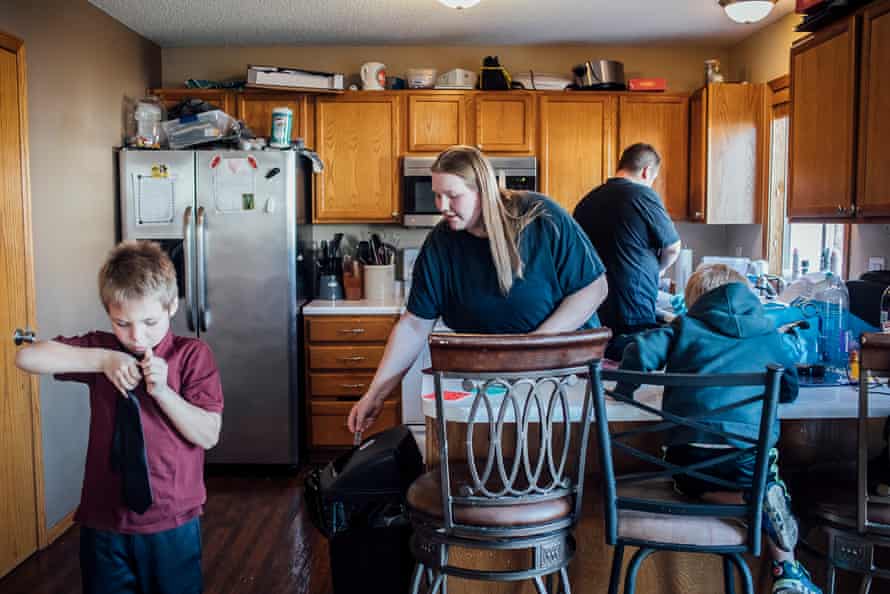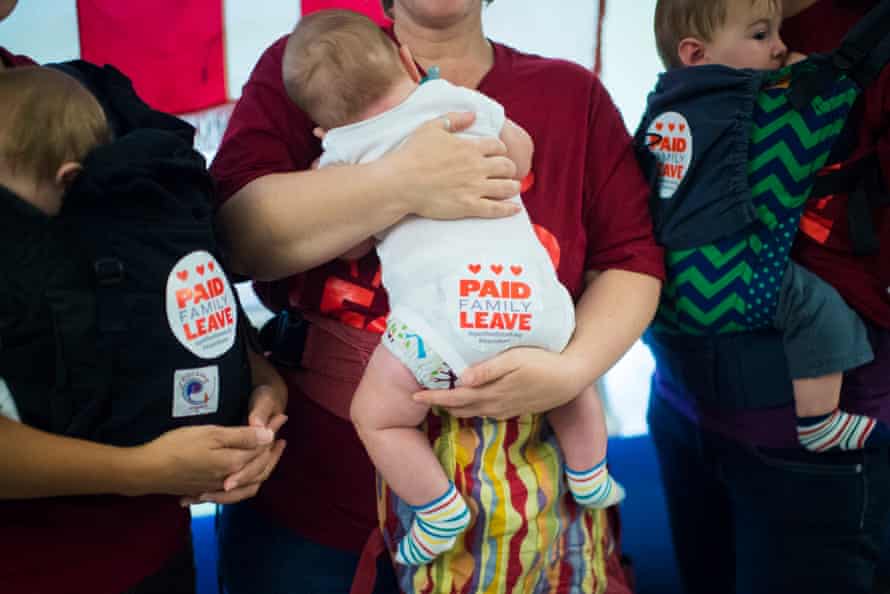Taking a Week Off Work Before Delivering Baby
Jessica Rebeschini was advised to have at least vi weeks off work to recover from an emergency C-section surgery and bond with her newborn kid, Karter.
But with no paid maternity get out and bills due, the 26-yr-old had no choice but to immediately start looking for a chore.
Within two weeks, she was working 45-60 minutes weeks as a waitress doing nightshifts. She was earning $4.35 an hour conveying heavy trays and walking several miles a mean solar day – pumping breastmilk in the restaurant toilet when she could, and living in fear of her C-section scar reopening.
"The biggest matter was that I was kind of scared. When you accept major surgery similar that and then y'all're pushing your body then harshly," said the female parent of three from Bondurant, Iowa, who is remarkably phlegmatic well-nigh the experience.
When she got home, Rebeschini would have over childcare duties from her husband Ron, 33, an optician, so he could become to piece of work.
"I retrieve every time I had to piece of work I was similar 'please don't reopen,'" she says of the scar on her abdomen. "I mean I was essentially risking my life."
Rebeschini's experience is far from rare for America's mothers. 1 in four women in the US return to work inside two weeks of childbirth, according to the advocacy group Paid Exit US (PL+U.s.a.).
The American College of Obstetricians and Gynecologists (ACOG) recommends women take at least six weeks off work following childbirth. But with no federally mandated paid family leave, for many women motherhood leave is an unaffordable luxury.
The US is one of but 3 countries in the world not to offering statutory paid maternity go out, according to analysis by the International Labour Organisation, and only 17% have admission to paid leave, co-ordinate to US Section of Labour statistics.
"If you expect at paid leave rates between white families and families of colour, information technology'southward fifty-fifty worse," said Myra Jones-Taylor, chief policy officeholder at kid development non-profit Zero to Iii. "Parents merely tin can't afford to stay dwelling house with their babies."
Rebeschini, who left her previous chore around a month before the birth, said financially she had no option but to work.
"We had two dollars left in our bank account. I remember thinking to myself, had I not been working, my [rent] cheque would have bounced and nosotros wouldn't have had a place to live."
Working shifts of up to 12 hours, she institute the separation from her newborn agonising.

"I would come up domicile and the first thing I did was brand sure that he was animate … When you're not physically at that place you just accept to trust that he'due south fine. Y'all worry about the bail of being gone for so long … is he going to recognise you?"
She said she didn't dare tell her new employer how recently she had given nascency for fearfulness of being considered a liability. While her managing director was supportive of her pumping breastmilk, there was nowhere suitable to practise it. "And so I had to take my breast pump into the bathroom and promise that no i came in and saw me pumping."
Karter is now iv years sometime, simply Rebeschini worries about the potential touch of her early absenteeism.
"[He] has disabilities and we didn't catch that until he was over a year one-time … I don't know if we would have caught information technology sooner had I been home more."
Today she still experiences pain in her abdomen which she attributes to returning to work and so soon.
Rebeschini has since had a third kid, Brody, who is now one. This time, she took ii months off, simply with no maternity pay it resulted in the couple falling behind on bills and having to declare bankruptcy – delaying their program to buy a home.
"You can gear up all y'all want to be off for a certain time and not have pay but it just doesn't work. If we had paid leave, we wouldn't accept fallen so far backside that nosotros couldn't get ourselves out of a hole. We wouldn't have that stain on our credit."
Dr Rebecca Jackson, professor of obstetrics and gynecology at the Academy of California, San Francisco, said breastfeeding is 1 of the biggest challenges for women who render to work early – specially low-wage workers.
"If you're driving a bus, how do you finish that motorcoach to pump milk?"
After a C-section, she recommends women take eight weeks off and to avert heavy activity to prevent complications. "A lot of women all the same have pregnant pain at two weeks after," she said.
Kirstin Moody, 36, a waitress from Hattiesburg, Mississippi, could only afford to take one calendar week off after giving nativity to her son Alex, at present thirteen, by emergency C-section. The waitress concluded up ripping her incision six times and every bit a result tin can no longer feel her lower stomach.
"I would feel like I was on burn, like somebody would have a hot poker and just elevate it beyond the lesser of my tummy," Moody said. "I was on pain medication for some of the fourth dimension only it generally doesn't help because you don't go to fully rest your body."
As a unmarried mother, Moody depended on the aid of family unit for childcare while she worked nights. Parting with her newborn son was intolerable.
"Oh God it was horrible. I cried and cried and I would sit down at work and I would cry."
Paid family go out has gained broad support and looks set to become a policy point in the 2020 presidential ballot, though there are still disagreements in Washington on how to pay for information technology.

In December the White House held a summit dedicated to the bailiwick and recently passed a law to give 2.1 million federal workers 12 weeks of paid parental exit. So far, eight states and the District of Columbia have passed their ain family unit leave bills.
But despite all the momentum, millions of women are even so having to render to work later on childbirth long before they are ready.
"On the politician front end at to the lowest degree at that place's progress," said Jones-Taylor. "But any fourth dimension we have a mother who is going back to work bleeding that's not good for mum, it's not expert for babies, and information technology'south actually only not good for the workforce."
According to National Partnership for Women & Families, the benefits of paid family leave in states that accept introduced information technology include improved worker morale, time for parents to bond with their children, increased breastfeeding, more than children getting vaccinations on time, cuts in children'due south hospital admissions and reduced probabilities of having ADHD and hearing problems.
It also reports a reduced chance of new mothers having postpartum depression and women who have paid go out are 93% more likely to be working nine to 12 months after childbirth than those who don't.
Currently, the simply national maternity provision falls nether the 1993 Family and Medical Leave Act (FMLA), which entitles new parents to up to 12 weeks of unpaid leave. But it depends on the parent being able to afford to take unpaid get out and simply 60% of the The states workforce is covered.
Although some individual companies are starting to take hold of up by offering paid family leave as a do good, many women get effectually the inflexibility of the corporate world by starting their own businesses. But with no paid motherhood leave, at that place is still force per unit area to go back to piece of work.
Jessica Isle of man, 35, possessor of Chicago-based dazzler company Ari Rose Torso Care, was back at work five days after giving birth to her one-yr-old daughter Lila.
Her partner Bryant Ousley, 33, was working long hours in a new job and did not qualify for any parental get out, so Isle of man was also doing the majority of the intendance for their iii children.
"Being a pocket-sized business owner I felt that there was no other fashion that things were going to go along going without me and then it was more of a necessity than anything," she said. "And and so of course it impacts your income. And then we accept a new baby and we have three kids, to not work and not take that income would too bear upon our household."
Virginia delegate Jennifer Carroll Foy was back on the entrada trail knocking doors two weeks later on giving birth by C-department to her now 2-year-old twin sons Alex and Xander, who were built-in premature and spent four months in neonatal intensive intendance.
"I had tremendous back pain, shoulder hurting, and you take to think that you're but coming out of major surgery where you are literally being sliced open and giving life to human being beings, it takes a lot out of your body. Simply I was in a position where there was no time to rest, I didn't accept an selection to relax."
Caroll Foy, 38, who was then even so working equally a public defender, was on inability benefits – which in some states can be used for pregnancy – so she was entitled to a portion of her income. Only with she and her husband Jeffrey Foy, 38, a supervisor at a non-profit, taking cuts to their paycheque, their finances came under strain.
Information technology was such a wake-upwards telephone call that she has introduced a paid family unit go out bill in Virginia. "When you're bringing a new child into this world and you're expanding your family, your income shrinks … I want to make sure that other women and families don't accept to make the aforementioned painful decisions about being with their newborn babe or paying for their bills and keeping a roof over their head."
jordansubjectence.blogspot.com
Source: https://www.theguardian.com/us-news/2020/jan/27/maternity-paid-leave-women-work-childbirth-us
0 Response to "Taking a Week Off Work Before Delivering Baby"
Post a Comment